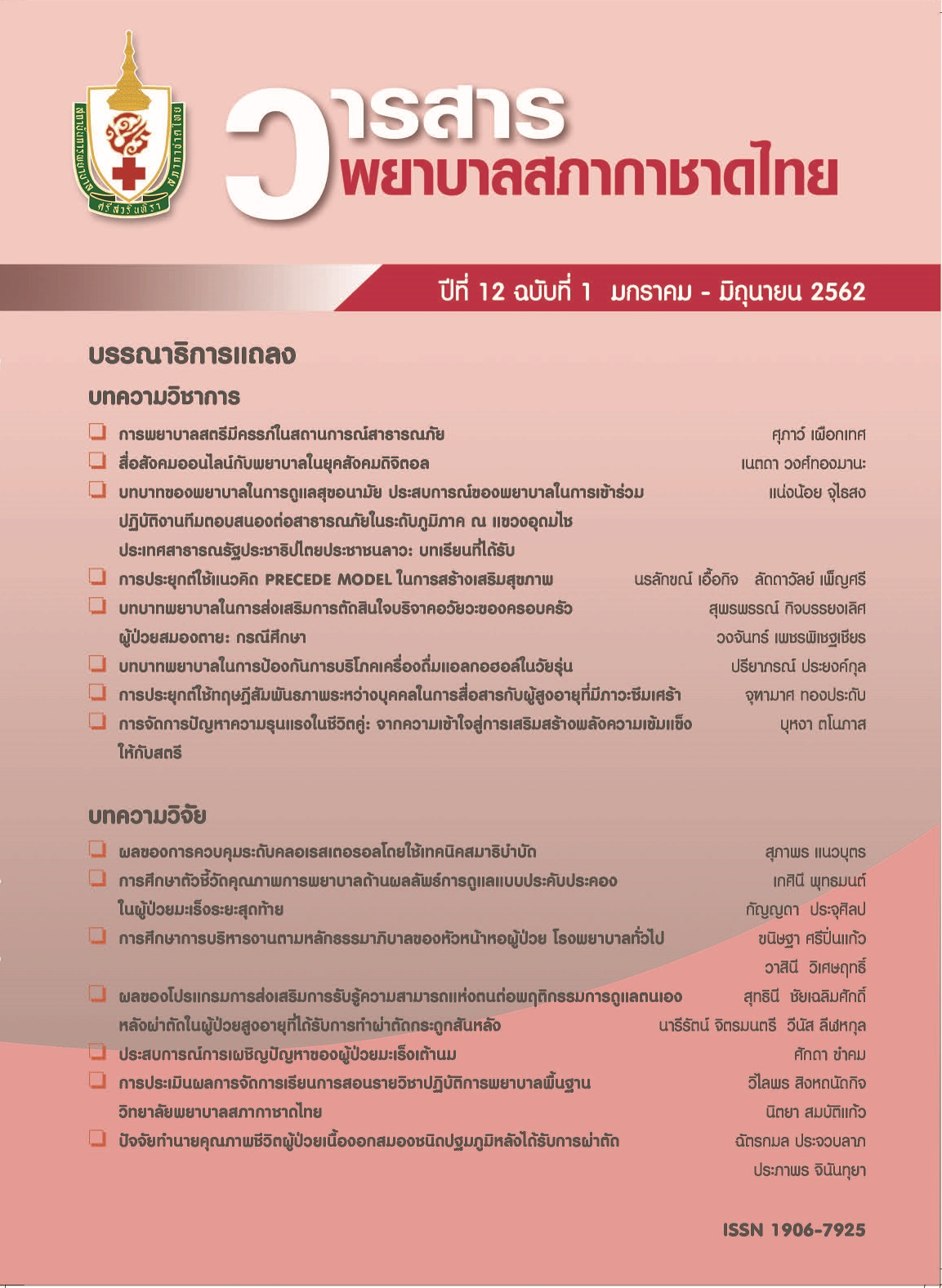Coping Experience of Patients with Breast Cancer
Keywords:
breast cancer, coping, experienceAbstract
This phenomenological research aimed to study the coping experiences of breast cancer patients as regards stress and the coping concept of Lazarus and Folkman. In-depth interviews were used to collect data from forty-five participants who had breast cancer and had undergone treatment in Nakhon Ratchasima. Data were analyzed using the modified Colaizzi's method. The results were as follows: 1. Reaction to illness. i) Phase of screening and waiting period; most of them were frightened, worried, and fearful that they would have cancer. ii) Phase of knowing the results; they had different reactions such as denial, separation, anger, bargaining, depression and acceptance. iii) Phase of living with the disease; they sought more knowledge and decreased stress and anxiety. 2. Adaptation i) Lifestyle change post-illness; they worked less and were more concerned about the care of themselves. ii) They were not suicidal because they feared sin. iii) Reasons for living were loving and caring for their families. iv) After illness, they felt their life was precious so they must take greater care of themselves. v) Feelings in daily lifestyle; most of them thought that they were valuable, advantaged, accepted and fought the disease. 3. Mental Health and coping; Most of them were of healthy mental health status. They consulted and asked for support from their families. The findings of this study will be beneficial in promoting mental health and adaptation for future breast cancer patients.
References
2. American Cancer Society. Cancer facts and figures [Internet]. 2016 [cited 2017 Dec 10]. Available from: https://www.cancer.org/research/cancer-facts-statistics/all-cancer-facts-figures/cancer-facts-figures-2016.html
3. World Health Organization, Regional Office for South-East Asia. Noncommunicable diseases in the South-East Asia region: situation and response [Internet]. 2011 [cited 2015 Jun 19]. Available from: https://www.searo.who.int/nepal/mediacentre/
4. สถาบันมะเร็งแห่งชาติ กรมการแพทย์ กระทรวงสาธารณสุข. ทะเบียนมะเร็งระดับโรงพยาบาล พ.ศ. 2558. กรุงเทพฯ: พรทรัพย์การพิมพ์; 2560.
5. Linden W, Vodermaier A, MacKenzie R, Greig D. Anxiety and depression after cancer diagnosis: prevalence rates by cancer type, gender, and age [Abstract]. J Affect Disord [Internet]. 2012 [cited 2017 Dec 20];141(2-3):343–51. Available from: https://www.ncbi.nlm.nih.gov/pubmed/22727334
6. Voorwinden JS, Jaspers JPC. Prognostic factors for distress after genetic testing for hereditary cancer. J Genet Couns [Internet]. 2016 [cited 2017 Nov 17];25(3):495-503. Available from: https://www.ncbi.nlm.nih.gov/pmc/articles/PMC4868861
7. Boyes AW, Girgis A, D’Este CA, Zucca AC, Lecathelinais C, Carey ML. Prevalence and predictors of the short-term trajectory of anxiety and depression in the first year after a cancer diagnosis: a population-based longitudinal study. J Clin Oncol 2013;31(21):2724–29.
8. von Heymann-Horan AB, Dalton SO, Dziekanska A, Christensen J, Andersen I, Mertz BG, et al. Unmet needs of women with breast cancer during and after primary treatment: a prospective study in Denmark. Acta Oncol 2013;52(2):382–90.
9. Mols F, Husson O, Roukema JA, van de Poll-Franse LV. Depressive symptoms are a risk factor for all-cause mortality: results from a prospective population-based study among 3,080 cancer survivors from the PROFILES registry [abstract]. J Cancer Surviv [Internet]. 2013 [cited 2017 Nov 17];7(3):484–92. Available from : https://www.ncbi.nlm.nih.gov/pubmed/ 23677523
10. Carlson LE, Clifford SK, Groff SL, Maciejewski O, Bultz B. Screening for depression in cancer care. In: Mitchell AJ, Coyne JC, editors. Screening for depression in clinical practice. New York: Oxford University Press; 2010. p. 265–98.
11. Ho SS, So WK, Leung DY, Lai ET, Chan CW. Anxiety, depression and quality of life in Chinese women with breast cancer during and after treatment: a comparative evaluation. Eur J Oncol Nurs 2013;17(6):877-82.
12. Hofso K, Rustoen T, Cooper BA, Bjordal K, Miaskowski C. Changes over time in occurrence, severity, and distress of common symptoms during and after radiation therapy for breast cancer. J Pain Symptom Manage 2013;45(6):980-1006.
13. The National Comprehensive Cancer Network. NCCN clinical practice guidelines in oncology Version 1 [Internet]. 2014 [cited 2014 Apr 18]. Available from: https://www.williams.medicine. wisc.edu/palliative.pdf.
14. Lazarus R, Folkman S. Stress, appraisal, and coping. New York: Springer; 1984.
15. Li J, Lambert VA. Coping strategies and predictors of general well-being in women with breast cancer in the People’s Republic of China [abstract]. Nurs Health Sci [Internet]. 2007 [cited 2015 Dec 20];9(3):199-204. Available from: https://www.ncbi.nlm.nih.gov/pubmed/ 17688478
16. Golden-Kreutz DM, Andersen BL. Depressive symptoms after breast cancer surgery: relationships with global, cancer-related, and life event stress. Psychooncology [Internet]. 2004 [cited 2013 Dec 20];13(3):211-20. Available from : https://www.ncbi.nlm.nih.gov/pmc/ articles/PMC2150738/
17. Burgess C, Cornelius V, Love S, Graham J, Richards M, Ramirez A. Depression and anxiety in women with early breast cancer: Five year observational cohort study. BMJ [Internet]. 2005 [cited 2015 Nov 13];330(7493):702. Available from: https://www.ncbi.nlm.nih.gov/ pubmed/15695497
18. Akizuki N, Akechi T, Nakanishi T, Yoshikawa E, Okamura M, Nakano T, et al. Development of a brief screening interview for adjustment disorders and major depression in patients with cancer. Cancer [Internet]. 2003 [cited 2014 June 21];97(10):2605-13. Available from: https://www.ncbi.nlm.nih.gov/pubmed/12733160
19. Beck CT. Phenomenology: It's use in nursing research. Int J Nurs Stud 1994;31:499-510.
20. Arman M, Rehnsfeldt A. The hidden suffering among breast cancer patients: a qualitative metasynthesis. Qual Health Res 2003;13(4):510-27.
21. ภัทราภรณ์ ทุ่งปันคำ, ทิพาพร วงศ์หงษ์กุล, พัชราภรณ์ อารีย์, ขวัญพนมพร ธรรมไทย, ปิยวรรณ สวัสดิ์สิงห์, มาลัย มุตตารักษ์. ประสบการณ์ชีวิตของผู้รอดชีวิตจากมะเร็งเต้านม. พยาบาลสาร 2549;33(4):105-16.
22. จุรีรัตน์ กอเจริญยศ, ยุพาพร หอมสมบัติ, นัฐิยา เพียรสูงเนิน. ปัจจัยที่มีผลต่อการปรับตัวของผู้ป่วยโรคเรื้อรังของโรงพยาบาลนครพนม. วารสารวิทยาศาสตร์และเทคโนโลยี มหาวิทยาลัยมหาสารคาม 2554;30(2):193-208.
23. Rotegard AK, Fagermoen MS, Ruland CM. Cancer patients, experience of their personal strengths through illness and recovery. Cancer Nurs [Internet]. 2012 [cited 2015 Dec 20];35(1):E8-E17. Available from: https://www.ncbi.nlm.nih.gov/pubmed/21558850
24. Wang WT, Tu PC, Liu TJ, Yeh DC, Hsu WY. Mental adjustment at different phase in breast cancer trajectory re-examination of factor structure of the Mini-Mac and its correlation with distress. Psychooncology 2013;22(4):768-74.
25. Burgess C, Cornelius V, Love S, Graham J, Richards M, Ramirez A. Depression and anxiety in women with early breast cancer: five year observational cohort study. BMJ 2005;330(7493):702.
Downloads
Published
Issue
Section
License
เนื้อหาบทความหรือข้อคิดเห็นต่างๆ ในวารสารพยาบาลสภากาชาดไทยนี้ เป็นความคิดเห็นของผู้เขียนบทความ ไม่ใช่ความเห็นของกองบรรณาธิการ หรือสถาบันการพยาบาลศรีสวรินทิรา สภากาชาดไทย






